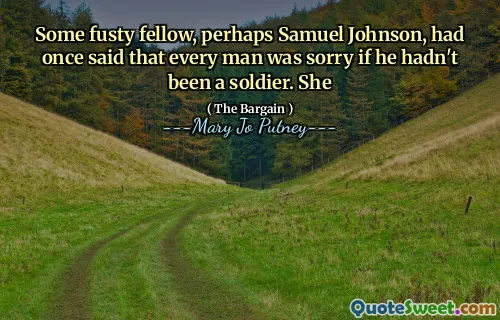
Some fusty fellow, perhaps Samuel Johnson, had once said that every man was sorry if he hadn't been a soldier. She
This quote invokes a nostalgic and somewhat wistful reflection on the value of having served as a soldier. The reference to Samuel Johnson—a prominent 18th-century English writer known for his wit and thoughtful commentary—adds a layer of historical context that enriches the quote’s weight. At its core, the statement expresses a certain regret or longing that individuals may feel for not having experienced the rigor, honor, or perceived glory associated with military life. It speaks indirectly to the human desire for purpose, courage, and contribution to a cause greater than oneself. The phrase "every man was sorry if he hadn't been a soldier" taps into centuries-old ideals of masculinity and valor, suggesting that societal views often conflate manliness with the willingness to fight or defend. However, the incomplete nature of the quote, trailing off with "She," hints at a broader narrative or a counterpoint to this convention—perhaps a female perspective or a challenge to the traditional glorification of soldiering. Mary Jo Putney, known for her exploration of complex characters and societal roles, might be setting the stage for a critical examination of such ideals in her book The Bargain. Ultimately, this quote encourages readers to consider the pressures and expectations placed on identity and the varied meanings of honor and regret. It also opens the door to revisit what constitutes true bravery and worth beyond stereotypes and outdated paradigms.






